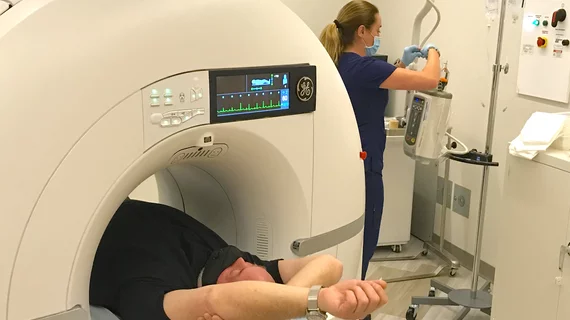The American College of Radiology (ACR) announced this week its government relations staff has been engaging federal agencies in an effort to improve product availability and hasten resolution of the ongoing iodine contrast shortage.
Following ACR outreach, the Division of Critical Infrastructure Protection within the U.S. Department of Health and Human Services (HHS) Office of the Assistant Secretary for Preparedness and Response convened a forum with its private sector partners to discuss the impact of the shortage on patient care. Matthew Davenport, MD, FACR, vice chair of the ACR Quality and Safety Commission, presented to the group, highlighting the profound impact the contrast shortage is having on practices and patients. Davenport also provided information about conservation measures described in a statement released earlier this month by the ACR Contrast Media Committee.
Read more on on the ACR suggested contrast conservation suggestions
ACR is asking FDA to authorize use of contrast agents from outside the U.S.
Separately, the ACR said the U.S. Food and Drug Administration (FDA) acknowledged the seriousness of the shortage and its impact on patient care and radiology practice logistics. The FDA, which has been working to address the shortage, is amplifying the conservation messages in ACR’s statement.
The ACR also said the FDA is looking at options to improve product availability. The ACR, other medical societies and group purchasing organizations have been asking FDA to consider approving an emergency use authorization (EUA) for contrast agents outside the U.S. that do not have FDA approval. This would be for temporary use in the U.S. until the contrast shortage is resolved, possibly by July.
"The ACR legal team and the governance team have been interacting with the FDA, providing them names of other companies that might have other iodine contrast agents available, maybe in Mexico or China that are available," said Alan Matsumoto, MD, FSIR, FACR, FAHA, professor of radiology, chair of the Department of Radiology at the University of Virginia, vice chair of the ACR Board of Chancellors, and the chairman of the ACR Commission on Interventional and Cardiovascular Radiology.
He said the ACR reached out to other organizations impacted by the contrast shortage, including the Society of Cardiovascular Angiography and Interventions (SCAI), the American College of Cardiology (ACC) and group purchasing organizations, asking them to contact the FDA and explain the seriousness of the shortage and how it is impacting patient care.
"We figured if we can get them from enough different angles maybe they will see that this is a crisis," Matsumoto explained.
Medical imaging is a primary tool for diagnosing and treating patients, he said, adding that doctors blinded by a lack of contrast media are unable to assess or treat many patients. "This shortage further emphasis the critical nature of biomedical imaging," Matsumoto emphasized.
Matsumoto described this effort and the overall impact of the contrast shortage in a series of video interviews with Health Imaging. The discussion included and measures being taken by his hospital and others to try and mitigate the impact of the iodine contrast shortage, which directly impacts imaging with computed tomography (CT), radiographic fluoroscopy (R/F), interventional angiography used by interventional cardiology, interventional radiology, neurology, vascular surgery and image guidance in operating rooms.
Watch Matsumoto's assessment of the situation, how contrast shortage is impacting care, leading to rationing and the alternatives being considered:
VIDEO: Imaging contrast shortage is delaying procedures and causing rationing
VIDEO: Gadolinium being substituted for iodine contrast in some procedures due to shortage
VIDEO: American College of Radiology working with FDA to mitigate contrast shortage
ACR asked GE to be more responsive with real-time updates on the contrast shortage
In response to member inquiries, the ACR also conveyed to GE Healthcare, the source of the shortage and supplier of more than 50% of the U.S. iodinated contrast, the need for up-to-date information. This includes the need for real-time updates about supply volumes, anticipated timeframes for returning to normal supply deliveries and other information so members are equipped to see their way through the shortage.
The shortage is due to the GE manufacturing plant in Shanghai, China, being shut down for several weeks as part of the Chinese government's lockdown of several cities to contain its recent outbreak of COVID-19. GE said it is working with Chinese authorities to get the plant back to full production as soon as possible.
GE said in a May 23 update that its China facility had increased production output from 0% of capacity when the plant was closed to 60% by May 21. GE Healthcare expects the plant to be producing at 75% in the next two weeks.
In addition, GE has expanded production at its Cork, Ireland, manufacturing plant and accelerated product deliveries by switching logistics routes where possible from sea to air from both Shanghai and Cork. GE also cut the number of types of contrast and packaging produced down to just three to ease production, which has helped increase output.
ACR said providers impacted by the shortage should reach out to the local GE diagnostic pharmaceutical representative to get the most current information. ACR also said members can reach out to ACR government relations staff if they still have unanswered questions after talking with their local GE representatives.
Related Imaging Contrast Agent Shortage News:
GE provides update on contrast media shortage
VIDEO: How the iodine contrast shortage is impacting interventional cath labs — Interview with Kirk Garratt, MD
Be prepared: IV contrast media shortage could last up to 8 weeks
Preserving contrast media supplies: 7 ACR recommendations
Frontline perspectives on the CT contrast shortage: 5 notable quotes
Gadolinium can be used as substitute for iodine contrast in some interventional imaging procedures

